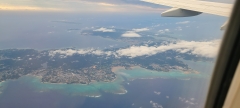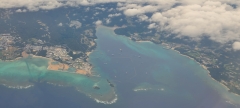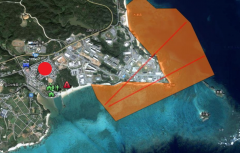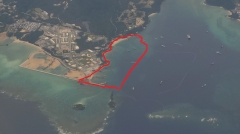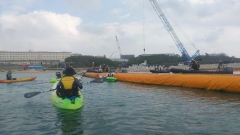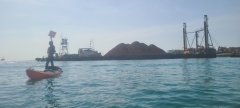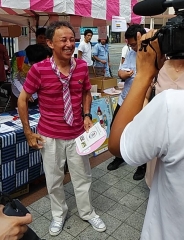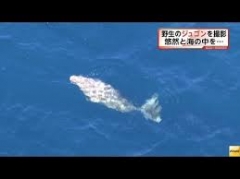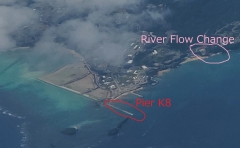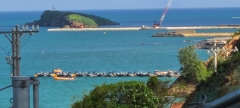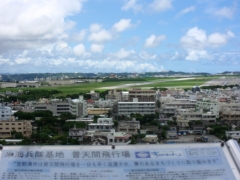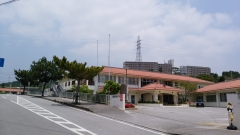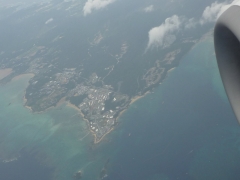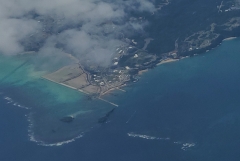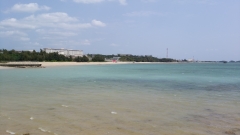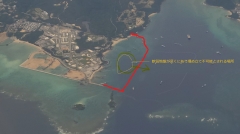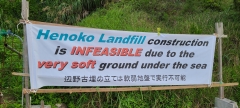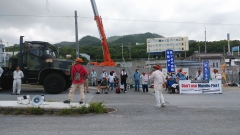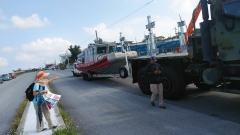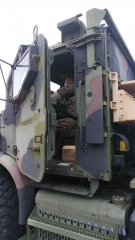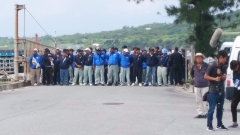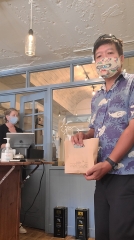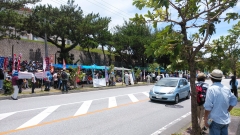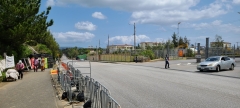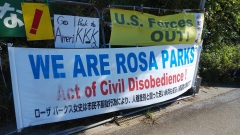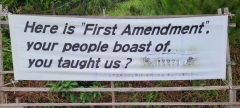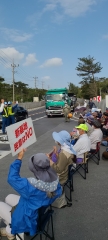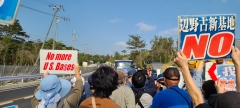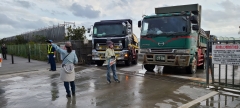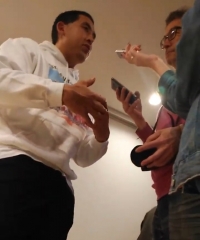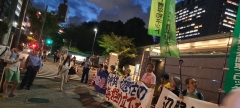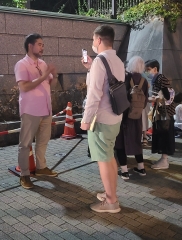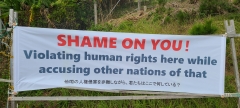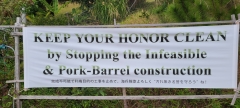11 June 2024
Dear US Government re: request for stopping the USMC new base construction in Okinawa, Japan
Update version of the letter below is posted on November 10, 2025. See this page.
Dear US President Biden, Congressmembers, Senators and other decision makers of the issue,
My name is MASAGATA, a Japanese man living in Tokyo. I used to study at San Francisco State University, where I majored in International Relations. I am now working as a translator using the English knowledge I acquired in the US.
I am writing this letter to urge US government to discontinue and terminate current ongoing landfill construction to build a new US Marine base runways at Camp Schwab, Henoko, Nago city, Okinawa prefecture.
This is the modified version of the letter I sent US Congress members and Senators in a joint Armed Forces Committee which was finalizing National Defense Authority Act several years ago. I added updated information to it.
I, myself visited Okinawa many times. I’ve been engaged in this issue since 2009.
The below is main points I would like to describe in this letter.
- What has been going on up until now
- Locals strongly oppose the new base construction
- Precious wildlife and ecosystem are threatened
- Technically, physically infeasible project
- America is held accountable for this stupid project
- Growing doubts about US commitment to Japan’s defense
- Your Servicemen & women and American residents are facing hostility in Okinawa
- Russia and China are watching what America is doing in Okinawa
9. KEEP YOUR HONOR CLEAN
Some of the below photos can be enlarged by clicking on them.
----------------------------------------------
- What has been going on up until now
Okinawa is chain of islands and southernmost prefecture below mainland Japan. The climate is subtropical and blessed with abundance of nature surrounded by coral reef. It is 3 hour-flight from Tokyo and very famous for marine leisure tourism just like Hawaii. In fact Okinawa went through the same path as Hawaii did.
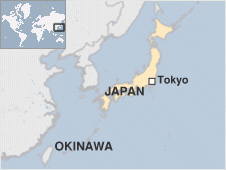
Until the end of 19th century it was an independent kingdom but annexed by mainland force. In 1945 US forces occupied Okinawa and then Okinawa has been occupied until 1972, which was 20 years after the mainland Japan regained sovereignty and was the only place that experienced ground battles within Japan, causing 200,000 civilian casualties during WW II.
The current population of Okinawa prefecture is 1.45 million.
In 1996 both the American and Japanese governments agreed to relocate US Marine Corp. Futenma base in Ginowan City, Okinawa to Camp Schwab to get away from the densely populated area around Futenma, together with some of Futenma capabilities to relocate to Guam in the Pacific.
Camp Schwab is on the coastline of Okinawa island, in an area called Henoko.
The relocation plan includes reclamation of the sea to build a new base that consists of two runways and ports expanding existing facility. Schwab is located in between Henoko coast (left) and Oura Bay (right) as you see in the photo taken on May 20, 2021.
The below marked area is the planned reclamation area on Henoko coast.
The two lines are runways built on the reclamation area. The big dot point on the left is residential area next to the Camp Schwab.
The below is the comparison to the current status with the reclamation plan.
- Locals strongly oppose the new base construction
Since the plan was announced, locals and activists from all over Japan have been protesting the new base construction by holding referendums, supporting candidates of mayoral and gubernatorial election, and municipal assembly members, who oppose the construction, as well as sit-in demonstration at the gate of Camp Schwab and kayaking at the landfilling site as civil disobedience act. Until now, tens of protesters were arrested and injured by police at the gate or coast of Camp Schwab.
In September2018, Okinawans elected Denny Tamaki as a Governor of Okinawa after death of then governor Takeshi Onaga, who was opposed to the new base construction. Mr. Tamaki succeeded the will of Onaga and won the election. He was formerly a Diet, Japan’s National Assembly member.
His father was a US Marine serviceman stationed in Okinawa and mother was Okinawan native. It was first time in Japan that a racially mixed man was elected as governor of one Prefecture. He proved that Japan is no longer homogeneous population and the nation can tolerate racial diversity. (Next photo is Mr. Okinawa Governor Denny Tamaki.
In February, 2019, Okinawa held referendum to ask whether locals approve or oppose the landfill construction at Henoko sea for the construction of a new United States Marine Corps base. The outcome was that 71% of voters oppose the new base construction.
The main reason to oppose the relocation of Futenma is the relocation takes place within Okinawa island, not outside of Okinawa prefecture, which cannot reduce burden on Okinawans' lives.
In September 2022, Tamaki’s second gubernatorial election was held and he won again overwhelmingly defeating other two candidates.
After the election, nationwide opinion poll was conducted by KYODO NEWS agency and revealed 57% of Japanese nationals are opposed to proceeding the construction.
- Precious wildlife and ecosystem are threatened
Many environmental activists also oppose the plan because of the abundance of forms of wildlife that are unique to the area around Camp Schwab.
This photo is of a dugong, an endangered marine mammal that eats grasses in the sea. It is just ridiculous that the nation that protests Japan’s whaling in the Antarctic Sea – and even dolphin hunting in Taiji, Wakayama Prefecture that ex-US Ambassador to Japan, Caroline Kennedy, a daughter of late President J.F.Kennedy, was eager to protest – is helping to threaten another marine mammals that live in Japan.
In Oura Bay, the world’s largest, oldest and the northernmost blue coral lives and has continued to grow for 3000 years.
Many new species are discovered in the bay recently. A lot more may be still undiscovered. It is estimated more than 5600 species including 260 endangered species inhabit in the Henoko and Oura bay area. That is more than all species in the Great Barrier Reef in Australia.
Great biodiversity for humanity lies in the sea. (The banner posted at the entrance gate of Camp Schwab where servicemen and women, and workers pass)
US Marine Environment Protection Organization, Mission Blue designated the area as one of “Hope Spots.”
https://mission-blue.org/2019/10/japans-first-hope-spot-honors-rare-coral-reefs-and-dugong-habitats/
On Henoko coast, the sea is now enclosed and being reclaimed and dugongs and other creatures’ lives are now threatened. Dugongs’ sea grass is found in the current reclaiming area and some of untouched planned areas. They are losing their feeding place.
As for blue coral, landfills can change the tide and might adversely affect life of the coral. Then what will happen is that your nation will be accused of helping to diminish such wonderful and rare creatures.
Actually, the Japanese Ministry of Defense carried out an environmental assessment in which it was claimed that there were no dugongs in the sea. But the environmental organizations such as WWF and The Nature Conservation Society of Japan claim that the MoD’s assessment was wrong and the organizations’ own research found clear traces confirming the existence of dugongs. Later, Okinawa’s local newspaper revealed the news that the MoD was aware of the finding but had covered it up.
Because of these facts, the petition to the White House to halt landfilling of the sea was launched in 2018.
https://petitions.whitehouse.gov/petition/stop-landfill-henoko-oura-bay-until-referendum-can-be-held-okinawa
(Stop the landfill of Henoko / Oura Bay until a referendum can be held in Okinawa Created by R.K. on December 08, 2018)
More than 200000 signatures were collected in two months.
The petition campaign was widely spread by a famous fashion model and TV personality, Rola (Mixed race woman between Japanese and Bangladesh), who posted the petition campaign on her Instagram page.
The White House has not yet responded to the petition officially.
Since 2022, another progress has been made as part of the reclamation project. One of piers to build on the sea for the reclamation was extended so that it is blocking one of major tidal currents to the bay.
As shown in the below photo taken on 12 September 2022 from the airplane, the red circle is pier K8 which has been extended. The pink circle area is the construction site of River Flow Change to the sea. That river, called Bisha-gawa pours cold water into the bay, which cools down the temperature of the sea water so that many unique species can survive.
Pier K8 viewed from River Flow Change construction site (Above)
Both the tidal current and the river flow to the bay are significant to keep the good environment for the wildlife in the bay. But these constructions destroy the environment.
- Technically, physically infeasible project
There are technical issues revealing infeasibility of the construction project as follows.
Active faults are found down below planned construction site of runways. If that is the case in California, the project wouldn’t be permitted.
Around planned construction site of runways there are buildings higher than US military aviation standard, flying helicopters or ospreys there might cause collision with these buildings, similar situation to Futenma Air Base in Ginowan city. (The below photo is Futenma base and its surrounding area from observatory site in the city.)
The buildings include school and its dormitory at which young students attend classes or reside. No plan of relocation is announced although a power transmission tower next to the building was already planned to relocate from that site. (The below photo is a local town next to Camp Schwab.) It is known over 350 buildings are placed above the height limitation for the planned runways. It is not only dangerous for locals but for pilots.
(Photo taken in Henoko district near the coast)
Illustration of how dangerous the flying zone of the planned new runways, excerpt from the local newspaper, Okinawa Times, the red line is the supposed height limitation for the runways.
Geological survey conducted in the sea to landfill indicates some area of sea ground is too soft to pile soil on like mayonnaise, which consumes more budget and time to landfill so the construction period should be much longer than expected like 20 years from now.
Or even more because the very soft ground exists in the layer of 90 meter below sea level but modern technology allows contractors to solidate the ground only up to 70 meter deep.
Okinawa Governor Tamaki revoked the landfilling construction permit due to such infeasibility but the Government of Japan sued the Okinawa prefecture to upend the revocation. The Supreme Court accepted GOJ’s argument not wanting to intervene in execution of governmental decisions, so the landfilling continues.
The below photo was taken in January 2018.
The project map of Henoko coast and Oura Bay reclamation to build two runways on relocation site of Futenma.
Although the landfilling has already completed in Heneoko sea side area (left side), but at this point only one third of all the planned area is landfilled.
Even after 6 years passed since landfilling started, only 15 % of total amount of soil for the construction project was used.
The photo below is Henoko coast side landfill seen on the ground in March of this year.
The photo below was taken in April 2017 before the landfilling.
Henoko side is shallow beach but Oura Bay side is twice bigger in size and much deeper.
Initially that bigger Oura bay side, was scheduled to be landfilled first but it was found even piers cannot withstand minimum level of earthquake in that area, where very soft seabed lies (yellow circle) under the sea. MoD knew this fact in 2015 but had not revealed it until 2017.
Even US GAO (Government Accountability Office) recently and the Washington base think tank CSIS recently reported Henoko landfill construction is difficult to implement due to the technical issues.
It is possible that the project is terminated halfway for some reason but irreversible damages would be left together with grudge from locals. Some portion of the budget for relocation of Marine Corp. to Camp Schwab and Guam is spared by US Government. That means this project wastes not only Japanese tax payers’ money but Americans as well.
It has been done for the interests of the few. The few, you might know, are certain businesses and government people who want some gains from the project. One of major contractors of the project is Taisei Kensetsu Corporation, where third son of the former Prime Minister, Suga, works. Typical "Pork Barrel" project." They are proceeding this just to make it "fait accompli."
As long as the construction goes on, the contractors can gain profits until the termination. For the Marines, the current Futenma base can be used as long as possible. While the construction goes on, irreversible damage on the environment is being expanded.
5 . America is held accountable for this stupid project
You might say this issue is something to be handled by the Japanese government, and that it is not the responsibility of the US military. But that sounds very hypocritical. The US military is the one that uses the facility and up until now involved in designing of new runways and annexed facilities. The US government can stop that project and find another relocation site outside Okinawa.
If the US continues to attribute this to the Japanese government, it is just like what Japanese conservative politicians say when it comes to the “Comfort Women” issue: “The Japanese Imperial Army was not responsible for kidnapping women in Asia for sexual slavery for soldiers during the war period in the early 20th century, it was what outsourced local brothels did.” The US Congress disavowed such argument and made a resolution to demand that the Japanese government apologize for former comfort women in 2007.
There is a move on US military side recently. Last November a chief officer of 4 forces in Okinawa told Okinawa local media outlets that the runway construction on such soft seabed is difficult so that amendment to the plan is necessary. He also claimed Futenma Air Base is in fact more suitable to the military operation due to the existing longer runways and no obstacle in the surrounding area unlike Henoko so even after Henoko new relocation site is established, the US marine would like to continue to use Futenma Air Base.
This contradicts the agreement between US and Japan.
But such high ranking official openly claimed such things, meaning US side is very sure this construction is infeasible and relocation would never occur. That is very unfair practice.
- Growing Doubts about US commitment to Japan’s defense
In fact, the US military presence in Okinawa and even nationwide is becoming nothing but troublesome. More of us know that the US military presence no longer functions as defense or deterrence like in the Cold War era. China is said to be a new threat but we know that US-China relations have become more vital for your nation since China sometimes owns more US treasury bonds and buys more US goods than Japan does. China has become a larger economy than Japan these days.
According to the US-Japan Security Treaty, the US can reject request for sending troops to Japan if the Congress disapproves it at a time of crisis. The US commitment to Japan’s defense is not very firm.
We can easily predict that the US would not help Japan even if China and Japan became involved in a dispute for some reason such as the territorial right to the Senkaku islands located in between sea border of Japan and China. The US cannot send troops to assist Japan fighting against the Chinese military because such action might cause great losses for your national interests.
Current ongoing crisis in Ukraine revealed US reluctance to help its ally. US announced that they would not send troops to help Ukraine from Russian invasion although US signed the security assurance memorandum in 1994 and just before the invasion started, US claimed that it would not stop Ukraine from joining NATO members. Ukraine military once did joint military exercise with the US military so Ukraine expected that US and NATO allies would send troops and set no-fly zone over Ukraine like they did in Yugoslavia but such thing never happened.
US and NATO allies could fight in such affair if they were willing to even though they have no biding treaty with Ukraine. During 1990’s US and NATO allies implemented air strikes in Kosovo without a relevant treaty.
Military experts and even former US military officials say that the biggest reason that the US military forces stay in Japan is to cut cost of their own because Japan provides host nation support fund, which we call “Sympathy Budget” that accounts for more than 70% of total expense for the US bases in Japan. There are more than 130 facilities of US military in Japan. Most of the troops are stationed at 30 facilities in Okinawa prefecture that accounts for 1 % of total of Japan’s territory and population.
During Vietnam War, it was a transit point to transport soldiers, military weapons and equipment. Now there is no strategic importance. How many of US congressmen and senators knows Okinawa? Is this place worth keeping bases in?
Recently China increased military capability significantly so Okinawa, where several major bases are concentrated, now have become very vulnerable to the attack from China. Okinawa is obviously within China’s missile range. Once the dispute occurs, China can shoot missiles to destroy runways in Okinawa before any planes takes off. Military strategists claim it is better to disperse bases in Asia-Pacific in order to counter the military threat from China. Eggs in a bucket can easily be broken. China has more than 30 air bases for long-range fighter-jets around Taiwan while US military has only two, Kadena in Okinawa and Yokota, in Tokyo.
Taiwan crisis was recently highlighted but
Unlike the case in Ukraine, both the US and Japan cannot accuse China of occupying Taiwan since the two nations promised China with “One China Policy” in exchange for normalizing diplomacy. China is our close neighbor. We do not want to be attacked by China for Taiwan for the sake of US twisted foreign policy. Japan’s economy is in fact, more dependent on China than the US. Letting US military use the bases within Japan to assist Taiwan is detrimental to our national interests.
In addition, like Russia, China possesses nuclear arms. As for what is going on in Ukraine, US could not get involved in the war against Russia because it wants to avoid the nuclear war.
We are sure that's the same case for the war against China.
Deploying your military so much in our country, especially Okinawa is just causing growing distrust against your country. I believe the Okinawa issue presents the perfect timing for your nation to rethink its military deployment in Japan in order to improve the relationship between the two nations. Constructing a base on reclaimed land in the Henoko sea is the worst possible idea.
The Image of America is getting worse lately
US military presence functions to apply American influence on our nation. Yes, it did work that way but you really have to know this may be working negatively. The image of your country itself is no longer positive like in the past. In other words, the US is no longer a powerful land of dreams, nor is it any longer a role model for us.
One example of this can be seen in a recent best-selling book on your country’s poverty issue. The title of the book is “Rupo Hinkontaikoku America” (Report, Poverty Superpower, America). It was written by a Japanese journalist, TSUTSUMI Mika. The book describes how Americans are struggling with poverty in a plutonomy society and explains how Japan should not follow suit.
We know that a lot of young Marine troops stationed there come from poor families that cannot afford college education and have problems like domestic violence. They join the Marines by system, so called, Poverty Draft. That is why they cause troubles with Okinawa locals.
In addition, four years of Trump administration proved disparity among your nation. Although Trump lost in previous presidential election. 74 million Americans voted him, record number among sitting presidents. His comments during the administration delivered very negative images of America to Japanese citizens. We expect him or someone like him would be reelected in the near future, which is disappointing me, who learnt decency of America.
- Your Servicemen & women and American residents are facing hostility in Okinawa
In September 2019, US Marines faced apparent resistance from locals and activists. citizens blocked port entry of US Marine vehicles carrying a boat for training. The port was located in Motobu town, 30 minute drive from Henoko and the boat was supposed to be shipped to nearby island.
Young military servicemen and women had to hear yelling from protesters and waited inside the vehicle for hours without air condition. The Marine vehicle was trying to enter the port to unload the boat to use for training on the sea.
Even port workers were standing at the entrance as human shield. The workers oppose military use of the port because they want to allow only civilian use. After 10 hours of sit-in protest, Marine vehicle with the boat on a trailer had to leave the port to go back to Camp Schwab.
Recently I met an American woman who manages a cheese shop “Little Greek Kitchen” at Plaza House Shopping Center in Okinawa. She was interviewed by Japan’s national television station NHK, and said that she did not want her shop to be recognized as US military affiliated because reputation of US military has been very bad. She welcomes anyone regardless of nationality or what organization they belong to.
I, myself have begun to think the oppression by the US military is due in part to America’s racial prejudice against Okinawans as well as all of Japanese nationals.
I, myself have experiences of racial discrimination while I was a college student in the US, 1990’s. America is in fact, white dominated racist society. That is why Trump was elected. People other than white are easily generalized and discriminated.
At the Camp Schwab gate, every day they have to see the protesters’ civil disobedience act and in many times being yelled at and called names. They never feel welcome. I do not think they feel honored to serve Marine Corp. as long as they are stationed in Okinawa.
Protesters Tent set up across the road along Camp Schwab
Camp Schwab gate for servicemembers
What they see at the gate
15 minute walk from the Camp Schwab personnel entry gate is construction vehicle gate where every weekday, protestors sit-in to block the construction vehicles so that less vehicles could get in and delay the construction.
In Abu and Shiokawa ports located on the opposite side of the island, where soils for the reclamation is being transported from nearby mountains to Henoko, local protestors stand in front of trucks to slow the work.
Not only Henoko runways construction issue but recently PFAS contaminated water leaking from US bases in Tokyo and osprey crash in nearby area of Okinawa which killed 8 crews happened, were reported widely and angered Japanese people.
Do you think this situation creates healthy relationship among US, Japan and Okinawa? Proceeding of such unnecessary and infeasible construction are just making things worse. It should be halted immediately for the friendship or for the time being, construction must be stopped for the review.
Current Japanese government is willing to continue this but the opposing parties announced the termination of the construction if they regain the governance of Japan since the local protest is growing bigger than ever and the construction is found to be infeasible.
- Russia and China are watching what America is doing in Okinawa
Russian President Vladimir Putin mentioned this Henoko new base construction issue in December 2018 and claimed doubts about Japan’s territorial sovereignty on northern territorial islands just below Sakhalin which currently Russia administered because the construction has proceeded even though local governor and local residents opposed the plan.
If Japan is a democratic sovereign state, that shouldn’t happen. Russia worried if the islands were returned to Japan, US military bases might be placed just near the Japan-Russia boarder. Thanks to that, the territory was never brought back due to Japan’s too much dependency on US military.
Putin just recently brought up history of nuclear attacks in Hiroshima and Nagasaki as America's inhumane acts. He claimed that Japan should recall this attack as America's inhumane attack on Japan. Russians are interested in the Henoko issue so when the referendum was held in February 2019, journalists of Russian Media Outlet came to Okinawa to report what is going on. I was interviewed by them and was asked why Japanese conservatives support such US military base construction despite their nationalism. (The photo below is the Russian journalists interviewing beforementioned White House petition campaigner, Rob Kajiwara, Naha city, Okinawa, February 2019)
In May of 2022, I, myself was interviewed by a Chinese journalist from Shanghai. Chinese also are very interested in this issue to know how US and Japanese governments treat Okinawans for the Henoko new base construction issue as well as Russians are.
Even just recently Russia frequently is coveraging this issue, I met a Russian journalist from Russian State Media, Sputnik at the gate of Ministry of Defense Building in Tokyo last August.
(The next photo is a Sputnik journalist coveraging the demonstration at the gate and interviewing one of the activists)
US claimed that democracy is best system for humanity. So authoritarian regimes such as Russia and China are not good. But in Okinawa US seems to prove the reverse. As things like go on, these nations would bring up Okinawa issue to counter US appeal of how great democracy is.
As for practical solutions, I recommend your organization to review a proposal by a private think tank, The New Diplomacy Initiatives (http://www.nd-initiative.org/en/), which suggests removal of US Marine bases from Okinawa but instead, establishing joint Humanitarian Assistance/Disaster Relief (HA/DR) Corp. with Japan’s Self-Defense Force equipped with high speed transport vessels, which rotates around East Asia. It is cost-effective and able to contribute to security of the region more realistically.
9. KEEP YOUR HONOR CLEAN!!
Rationality is what Americans value most when it comes to policy-making. I hope US make a very rational decision on this issue for the friendship between the two democratic nations. Such infeasible and stupid construction is the most irrational thing to do in history.
Unlike other issues related to US military presence in Japan, this is something that can be stopped, at least temporary halted only by the US side for the sake of your own national interest.
It is the very best way to “KEEP YOUR HONOR CLEAN” as Marine Hym sings.
Regards,
P.S. Permit me for writing some awkward or grammatically incorrect phrases since I am not a native speaker of English.
I recently wrote a novel based on this issue. Please read the story so that you can feel like being in Henoko.
17:51 Posted in Ecology, Japan News, Politics, Society, US-Japan relationship, USA issues | Permalink | Comments (0) | Tags: military, okinawa
08 March 2024
Film "Elvis" American culture is Black culture!
I watched the film on my flight to Paris from Tokyo last week. The film helped me to kill time during the very long flight hours.
It was a biography of the king of rock, Elvis Presley. He was born in southern state where seggregation was very common. But he grew up in a Black community so he had no prejudice against Black people but rather appreciate his experience with Black people who inspired him to sing in a new style. That is why he sang the requiam song for Dr. Martin Luther King "If I Can Dream" in 1968.
That may be a reason why he played a protagonist in the musical film "Blue Hawaii (1961)" in which he marries a native Hawaiian woman."
His life was not always glorious nor very happy one because of his parents' treatment of him. He was mama's boy and his father was weak so he and his family were manipulated by a conman who managed his showbiz activities. The conman did not have a US citizenship so that is why he could not hold the world tour. I felt very sorry because if the conman did not stop him to go to the world tour, he could visit Japan and sing at Japanese audience. He said he wanted to do that. That was more profitable for him and his family but very bad for the conman. His life was shortened due to the hardwork imposed by the conman.
His singing style such as waving his waist was affected by Black singers he was acquianted with. In fact, his singing is Black singers' style. That is why conservatives tried to stop him from singing in public. Black culture had been considered vulgar culture but created a very unique American culture. None the less, Black people have been oppressed in America. America took them to his land forcibly depriving of their human rights and treated them as slaves and second class citizens while gaining cultural advantage from them.
Elvis Presley was a byproduct of America's cruelty. I felt very saddened to know such history.
Entertaiment industry is grotesque everywhere in the world. In Japan, recently it was found boys being sexually abused by a big boss of the most influential entertainment agency.
As I get older and learn more about such stories, I am losing interests and admiration to showbiz industry. I don't enjoy such shows any longer. I rather read books than films.
I am hoping we will no longer need human singers or actors but Artificial Intelligence creates such super stars.
12:30 Posted in Culture, Film, Music, Travel, USA issues | Permalink | Comments (0) | Tags: racism, history
31 July 2023
French film: "SIMONE, Woman of the Century, We're living in a better world!
I just saw the film at a small theatre in Tokyo.
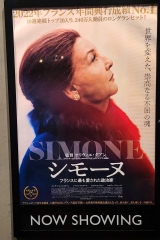
It was a biopic about the French politician who lived through holocaust and after the war became a lawyer and the minister of French government and became the first female president of European Union assembly.
She helped promote women's rights by legalisation of abortion in France, 1970's. She contributed to improvement of prisoners' condition. Why was she so enthusiastic about human rights issues?
The film started with her childhood in Nice with her family living in a happy condition before the second world war. Her family were Jews and believed France would never betray them.
But later her family were arrested by German Gestapo. She, 16-year-old, her sister and mother were deported to Auschwitz. Her brother and father were thought to be executed. The three survived in Auschwitz but they were deported again, and then her mother died in other concentration camp.
After the war, Simone married a man and gave birth to three children studying at a law school in Paris. But she had been traumatized by her experience in the holocaust and couldn't sleep on a bed. Even after the war, she could not tell others about her horrible experience during the war.
But such experiences motivated her to help others in the world. In her old age, she came back to Auschwitz on 60th anniversary of liberation of Auschwitz. She spoke and wrote all about her experience. She insisted that Europe should get united so no more war happens. Surprisingly she had lived in Germany after the war.
The film taught us it is the responsibility of living people to make the world better place and right the wrongs. Indeed, we are living in a better world, at least much better than what she experienced.
I, myself have visited Auschwitz in Poland, and learnt what happened there.
Such history should never be repeated. I felt it is MY responsibility not to let such horrible events happen again.
Sadly, it is happening and very hard to stop that.
02 July 2023
Affirmative Action cannot be a solution
US supreme court ruled the affirmative action which sets racial quota in college admission is unconstitutional.
I, myself think it is not a bad ruling.
When a college chooses who is qualified for its students, why does race matter? Grade Point Average, entrance test scores do matter. Race matters only when an interview is conducted.
As for diversity thing,
As Justice Thomas Clearance said,
"I'd like you to tell me expressly when a parent sends a kid to college, they don't necessarily send them there to have fun or feel good or anything like that," Thomas said. "They send them there to learn physics or chemistry or whatever they're studying."
Yes, school is for nothing but studying subjects to get education.
Discrimination is a problem when the college rejects a student only because of his/her skin color.
Even college admission solely based on scores and ability to study, results in racial or gender bias, this does not mean it was an unfair judgement.
Selecting someone based on his/her trait by birth cannot be a good way to remedy society.
Thomas Clearance nominated by Bush administration era was a good example. He's made several rulings against his own people so he was not liked by his people as I recall my college days, a Black professor in Black Studies course said "Just because he was Black, this works better for Black people. No!"
America is a fundamentally white dominated racist society. So, such fundamental cannot be easily fixed.
23:13 Posted in Politics, Society, USA issues | Permalink | Comments (0) | Tags: afro-american, racism






